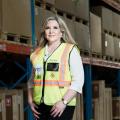Most traders within the customs environment are familiar with the Preferred Trader programme which was officially launched on May 8, 2017. SARS viewed this as being one of the most significant trade facilitation initiatives within the customs modernisation journey. In general terms, the Preferred Trader programme established a relationship between a client, SARS and customs, to achieve benefits for both parties, obtain a high level of compliance, promote legitimate trade and stamp out misconduct and fraudulent activities. This was established under the WCO’s internationally recognized Authorized Economic Operator programme and under the SAFE Framework of Standards principle.
The Authorised Economic Operator (AEO) programme, replacing Preferred Trader, was launched by SARS in November 2020 but was limited to importers and exporters only and the number of accredited traders remained low over the next few years. The application process was lengthy and time consuming, with some traders withdrawing their applications due to challenges and delays. However, over recent months, there has been a significant uptake in applications and SARS is seeing the results by recently announcing that the number of traders that had been certified had reached the 500-milestone. This number excludes applicants still in the process of being certified, but it is clear that the AEO Programme has become an important part of the supply chain. The strategic intent of SARS is to work towards a system of voluntary compliance, and this requires SARS to place more reliance on traders who choose to be compliant. The strategic objectives of SARS are to assist traders to clarify their obligations and help them fulfil those obligations whilst having the ability to detect and respond to non-compliance. An obvious benefit to SARS will be that, as more and more traders become AEO-accredited, customs can utilize their resources more effectively elsewhere to combat illicit trade, rather than policing compliant traders.
There are two levels of AEO accreditation, Level 1 (compliance) and Level 2 (safety and security). Compliance benefits include access to a Client Relationship Manager, reduced security amounts, reduced inspections, expedited processes, inspection of goods at the client’s premises, mutual recognition with major trading partners and authorized use of the AEO logo. Safety and Security accreditation benefits include all Level 1 benefits but are extended to include exemptions from certain customs supervisions, expedited refunds and drawbacks, security payments, co-ordination of Other Government Agency interventions, no charges for special attendance and the provision of quarterly trade statistics. Besides the benefits gained from SARS, being AEO accredited will have significant benefits when trading internationally as foreign companies who are also accredited will be aware that dealing with an AEO partner poses little or no risk. This would also apply to service providers within the supply chain when appointing a freight forwarder, transporter, manufacturer, warehouse or agent. It is clear that AEO accreditation will eventually become a 'must' rather than a 'maybe', with traders who are not AEO accredited gradually falling by the wayside.








